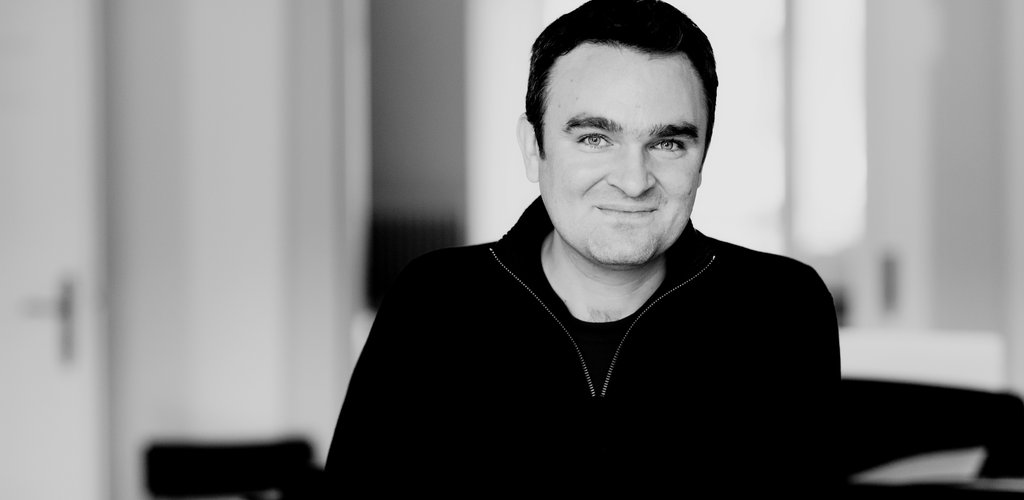György Kurtág would compose for him, even at the age of 92; he’s recently made a recording with András Schiff; he’s Dénes Várjon’s favourite chamber music partner; and universally adored by Hungarian audiences. Jörg Widmann, one of the world’s leading clarinettists, and described by many as both a modern and a true Renaissance man, will be giving a concert in Budapest on 1 June. When it comes to music, he simply cannot go wrong. He’s at least as gifted a conductor as he is as a soloist, and he has also garnered success as a composer. He will be playing and conducting his own compositions at the concert with the Budapest Festival Orchestra, as well as a Mozart piece.
Before the concert in Budapest, György Kurtág told me how highly he thinks of you. When he heard you play for the first time, he felt that he’d love to compose for you. Even at the age of 92, he hasn’t given up on this plan, especially since you’ve indicated how happy that would make you. What do you think could have struck him so powerfully?
Jörg Widmann: I have to say, I feel deeply touched by this story. For us, musicians, Kurtág is a living legend. Only last week, we were making a CD recording of Brahms’ clarinet sonata with András Schiff, and György Kurtág’s name came up a lot. We both have great regard for him. Performing together with him in 2004 at the Salzburg Festival was the greatest gift for me. I have played his piece “Homage to Robert Schumann” many times, with several musicians including Dénes Várjon, and I know and revere every note of it. I hardly dare believe that he can remember me and my request that he compose for me – something I never ask of others; he is perhaps the only one ever. It’s simply amazing.
According to Dénes Várjon, your favourite chamber music partner for 15 years, you are at home in every style. Which means whether you conduct, compose or play the clarinet, you make the most of everything.
J.W.: You can imagine how good this makes me feel. Interestingly, I can’t really keep these activities separate. When I’m standing on the conductor’s podium, I’m not leaving my composer persona behind, and naturally, when I compose, I do so playing my instrument. This comes naturally, but still, I’m flattered he sees it so positively. I think I’ll never forget the performance of Mendelssohn’s piano concerto, which we gave with Dénes in Budapest, in that beautiful hall at the renovated Liszt Academy. We were so perfectly attuned to each other. What a place, what music!
There’s one more reason I love to come to Hungary for, and that is the wonderful Hungarian audiences. I think I’ve never performed for a more devoted and open audience than the Hungarian. Perhaps I sensed a similar affinity from the Japanese audience, but they have a different way of expressing delight. At the risk of sounding too sentimental, I can feel this wave of love coming from the Hungarian audience wash over me. This is tremendously energising.
Ákos Ács, BFO’s principal clarinet, said you play your instrument like no other can. You can make your clarinet do anything. Was he right?
J.W.: I’m particularly flattered by this, because the reason I love playing music and devise various musical programmes is that it allows me to bask in the music I like with my instrument in hand. As a matter of fact, putting together the programme for a concert is like composing music for me. Being offered a new piece is immensely delightful – every performance feels like a premiere. But don’t think for a moment that playing a new piece is always smooth sailing. I felt more than once that I just couldn’t come to grips with a piece. I may struggle and suffer, but I don’t give up! I often spend a long time working with my own pieces until I feel I can play them the way I want to.
Another major strength of yours is the ability to bring together contemporary and classical music. Currently you’re playing both Mozart and your own pieces with the Festival Orchestra. Isn’t there a clash between the two?
J.W.: For me, there’s no difference between playing modern and old pieces. Music, however precisely it may be placed on a historical timeline, has the power to affect musicians as deeply as the audience when played with heartfelt and utter devotion.
Does hearing a Mozart fugue sandwiched between two Widmann pieces give us a different experience than a conventional concert? Are we going to hear a different Mozart?
J.W.: No, I don’t want anyone to think that I’m putting a new twist to this magnificent Mozart piece. It’s not that. I’m not trying to change the way this Mozart composition, which is so close to my heart, sounds. Perhaps the only difference you’ll be able to perceive is that my intimate knowledge of every tiny detail of the score will create the impression that the music that was composed centuries ago was recreated then and there.
The concert by Jörg Widmann and the Budapest Festival Orchestra will take place on 1 June at 7.45 pm at the Budapest Music Center.
